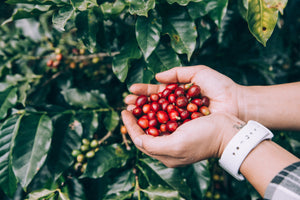
Behind the Cup: a Coffee Journey to Origin
Will Harrington, barista, roaster, and coffee aficionado, takes you through his experience of spending eight weeks exploring the beginnings of the coffee journey.
Living in producing countries…
After working with speciality coffee for the past 5 years, my interest and attention turned to what was happening at origin. Now as a barista and roaster involved in the developing UK scene I hear and read about the development and happenings in countries producing green beans. There's no doubt that information on coffee production has become more accessible over the last decade and now we’re starting to work more closely with producers at origin. However, you could sit in a coffee shop reading all you want about this, trying to learn as much as you can but nothing beats learning better than being there and experiencing it.
With this in mind, I booked a one-way flight to Colombia with the aim of meeting, networking, experiencing, listening, and volunteering with as many producers as possible. Hearing about producers' backgrounds, how their business and industry has changed over previous decades, and how they see the future of speciality coffee production in their country. This approach to the journey was open and deductive. Fast forward 6 months and I’d travelled over 2000 miles, stepped foot in eight producing countries, met over 50 producers, learnt endless information about coffee agronomy and botany, spent eight weeks living life as a producer, and tasted and experienced some of the best coffee’s in the world.
So, what information can I share with you from this journey? Here are some coffee highlights…
- Seeing your first coffee tree is an experience that you’ll never forget
We’ve all seen pictures and talked about coffee farms and trees. But when you set foot on a farm it's the best feeling ever, seeing the roots of your passion. A sea of lush green, a humid but pleasant feel in the air, the smell of sweet coffee cherries, the sound of happiness from nature, and the feeling of being part of a truly special ecosystem.
- The speciality coffee shop scene in producing countries is both engaging and expanding
It's true that most speciality coffee from producing countries is exported. However, speciality culture is growing, and, with this expansion, there are some amazing speciality concept stores appearing. For example, in Manizales, the capital of the coffee triangle in Colombia, I stumbled across a shop called Speciality Boutique Coffee owned by the Restrepo’s. Here I had THE best coffee experience of my life. The reason: these shops only use coffee from their country giving them a huge amount of knowledge on the product they serve. They have relationships with the producers, they know the agronomical differences between regions, and how the influences flavour in the cup; all of this amounts to a huge level of passion and pride that goes into each cup, which is shown in the service and attention to detail.
- Speciality coffee production is extremely labour intensive
All coffee starts on the same journey, human intervention is what decides how this coffee will turn out. Before visiting origin, I thought that there were ‘speciality’ farms and ‘commodity’ farms. But quality ultimately comes down to human intervention. By this, I mean soil nutrient maintenance, shade tree coverage, picking ripeness, time between picking and processing, attention to processing, and intensive sorting and screening.
- We’re starting to see the speciality of speciality but how accessible is it?
I spent time with some aspirational producers. These producers are pushing the boundaries of flavour development through - their model of business - processing, concentrating on the addition of acids during fermentation, only employing full time workers and educating them to ensure quality control practises are maintained at all times, controlling external factors during drying which include the use of UV filtering canopies, air conditioning, and de-humidifiers. After cupping the end product there is no doubt that these methods improve cup quality. However, expectedly, this comes at a cost leaving the accessibilities of roasting and serving this coffee restrained.
Why you should visit origin…
This coffee journey has opened endless opportunities for the future. I encourage any barista or roaster with a serious interest in life at origin to go for it, embrace it, and learn from as many of these people as possible.



